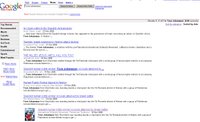What if the Palestinian Arabs who have lived for decades under the heel of the modern Israeli state are in fact descended from the very same "children of Israel" described in the Old Testament?
And what if most modern Israelis aren't descended from the ancient Israelites at all, but are actually a mix of Europeans, North Africans and others who didn't "return" to the scrap of land we now call Israel and establish a new state following the attempt to exterminate them during World War II, but came in and forcefully displaced people whose ancestors had lived there for millennia?
What if the entire tale of the Jewish Diaspora -- the story recounted at Passover tables by Jews around the world every year detailing the ancient Jews' exile from Judea, the years spent wandering through the desert, their escape from the Pharaoh's clutches -- is all wrong?
As I am not a Middle East specialist, I can't comment on the veracity of the book, but as a historian I can say that tradition is "invented" and rarely true. History is never proven. History is a type of story, and even if we knew all the facts (which we never do), there are countless different ways to tell the story, and there are varying meanings to attach to said facts. How we see our past is always coloured by the present.
In the end, we can't base a present day land claim on an unproven (and unprovable) story from the far distant past. People can never be restored to their "rightful" home (when the displacement was thousands of years ago), because people are always involved in voluntary and involuntary migrations. Once people have made a new home and have borne children there, you can't kick them out. This goes for both Palestinians and Israelis. Like it or not, this area has to become a home for both groups in one way or another. I prefer a one-state secular democracy, but recognize the challenges of this solution. We have yet to get over this "clash of civilizations" myth.
Interestingly, there are people arguing in the comments about genetic similarity/difference of Jewish people (for instance, that Jews are all surprisingly alike, or they are more similar to non-Jewish Arabs or non-Jewish Europeans or non-Jewish Ethiopians or whatever). While an interesting intellectual exercise (it can be helpful for tracing migration patterns in the distant past), this seems to me not only silly but potentially dangerous to use in determining current political and territorial rights. I'm pretty sure we no longer believe in reserving specific pieces of land for those with particular genetic sequences.













